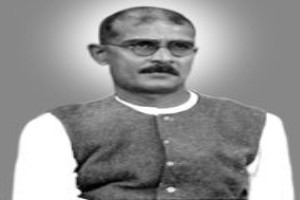
 By Mahadev H. Desai*
By Mahadev H. Desai*
Exorbitant rates hit the peasant very hard
Having devoted three articles to some of the things of striking interest in this Zamindari, I do not think I should be accused of a fault-finding spirit if I devoted one to criticism and constructive suggestions.
I have had no talk with the tenants on the bearability or otherwise of rent. But I put one or two questions to Sir Daniel himself. At the present moment the peasant pays Rs. 2 to Rs. 3 per bigha for a crop of five to six maunds of paddy fetching about Rs. 10 to Rs. 12. This would seem to be an exorbitant rate, and is sure to hit the peasant very hard in these days of fluctuating prices. There have been fortunately no rent case, but there would soon be, if the peasant had no protection against a slump.
Sir Daniel said, “There is no fear of the rent being excessive, as Gosaba No. 23 will yield double the usual crop.” This is an admission that the rent is excessive today. A prospective good crop is no argument to be advanced by a Zamindar of Sir Daniel’s type. If the rents were a fixed proportion of the produce – and they should be as low as possible, as Sir Daniel’s is no profiteering motive – they should rise or fall automatically with the price of produce.
Also read: History Recalled: Towards an ideal zamindari -4
Next I would take up the matter of co-operative credit. I wish I could have gone as deep into the matter as possible and found out if, as a result of several years’ co-operation and thrift, some at least of the members were absolutely free from debt, alike of the Mahajan and of the co-operative society. The little inquiry I made was not quite reassuring. If the co-operative society simply replaces the Mahajan without ultimately freeing the peasant from debt, the cheaper credit that it provides is likely to be a temptation rather than a facility. In a compact area like Gosaba, an experiment can easily be made of allowing much cheaper credit to members who have shown steady habits of honesty, promptness and thrift, enabling them to be free from debt.
Sir Daniel admits that not much welfare work has been attempted because he had to sink the bulk of the revenue in the reclamation of the Estate. But now that the reclamation is complete, no time should be lost in taking up welfare work in all its branches. There are something like fifteen schools, but they are quite elementary. Not only these need to be developed, but there is room enough for a number of night schools for adults.
There are three dispensaries on the Estate, and the doctors and midwife are within easy reach. But Sir Daniel will have to take effective measures for popular instruction in sanitation and hygiene. I asked if there was any special sanitary arrangement made for the disposal of the night soil. This was Sir Daniel’s reply: “No latrines are necessary here, as people are not accustomed to them. They go to the jungle, and the filth is washed away by the tide.”
This was rather strange from Sir Daniel Hamilton who would lose no opportunity of turning waste into wealth. I explained to him the easiest method of disposal of the night soil and of turning it into rich manure. “This would double the peasants’ garden crops,” I said to him, and it seemed to appeal to him. He who has easily introduced co-operation need find no difficulty in introducing the most economic method of the disposal of night soil.
There is such a thick growth of babul trees and such a large number of animals on the Estate that a co-operative tannery would be a perfectly feasible proposition.
There is the question of other village industries, the central one being of hand-spinning and hand-weaving. Hand-weaving is there, but hand-spinning is absent. Sir Daniel did try to introduce it but failed, as it was not found paying. He did not seem to know that unsupported by hand-spinning, hand-weaving was in daily danger of being swamped by mill-made cloth. Sir Daniel is himself keen on the promotion of home industries. On finding in the weekly hat (market) held there some beautiful bamboo flutes he purchased them all and invited the craftsman to come and teach the craft on his Estate. He will have to go further forward in this line.
To develop his Zamindari on the right lines and to make it a model one, Sir Daniel will have to invite workers and public men from Bengal. The Estate has certain advantages arising out of its isolation, but it has its disadvantages too. It should not be allowed to turn into a sleepy hollow or a stagnant pool. Men like Sjt. Satish Chandra Dasgupta and Dr. Prafulla Ghosh, not to mention bigger people like Sir P C Ray, ought to be invited to make a brief tour of the villages to tell them that they have a place – and an important place – in the geography of Bengal and of the country, and to show them how to become more industrious and more prosperous.
I looked in vain for any temple in the area. I was told that a request had never come, and that it was hardly necessary that it should come. “We do not want to have any Hindu Muslim riots,” I was told. Whilst I could understand Sir Daniel’s plain-spoken reply, I am sure his fears were baseless. There is some kind of a church on the Estate, why not then a temple and a mosque? The thing seemed to be brought home to Sir Daniel, as I asked the boys in a school I visited with Sir Daniel whether they ever prayed. They did not, nor did they know what prayer meant. “This thing had never struck me before,” said Sir Daniel, and wondered if there were any hymns in Bengali which could be sung alike by Hindu, Muslim and Christian boys and girls. I immediately suggested a hymn from Tagore and translated it for Sir Daniel, who saw nothing sectional or dominational about it.
But I have done, I have indicated the general lines on which development should be made in order to make the Estate an example for the other Zamindaris to copy. The tree of co-operation has taken firm root there. It will bear greater fruit with the development of other industries and with the growth of sanitation and hygiene.
The great step forward in the matter of rent and in the fulfillment of the sole purpose of co-operation will be taken when Sir Daniel decides to share the profits of the Estate with his tenants. He has the interests of the tenants at heart in all that he has done and has been doing. It is for him to take the final step. I understand that he has no immediate heirs. Let him set a glorious example by creating a trust of the Estate, having as trustees selfless men from Bengal and outside, who will administer the Estate solely in the interests of the peasants and who will use whatever comes out of the Estate for the development and benefit of the Estate. There has been no rent suit in all these thirty years. Let there never be any in future by laying it down that the Estate shall never make any profit at the expense of the tenants who will be peasant-proprietors. In that ideal condition of things Gosaba will be a beauty-spot in that area called Sunderbans, and a place of pilgrimage for Zamindars and poor peasants alike.
– Concluded
*Mahadev Desai was an eminent freedom fighter and Mahatma Gandhi’s personal secretary; article courtesy his grandson, Nachiketa Desai.






Thanks a bunch for sharing this with all folks you really know what you’re talking approximately! Bookmarked.
I have been exploring a little for any high-quality
articles or blog posts in this kind of space. Exploring Yahoo I eventually stumbled upon this website.
Reading this info So I’m satisfied to exhibit that I’ve got an incredibly just right uncanny
feeling I found out just what I needed. I such a lot undoubtedly will make sure to don’t
forget this site and provides it with a look regularly.